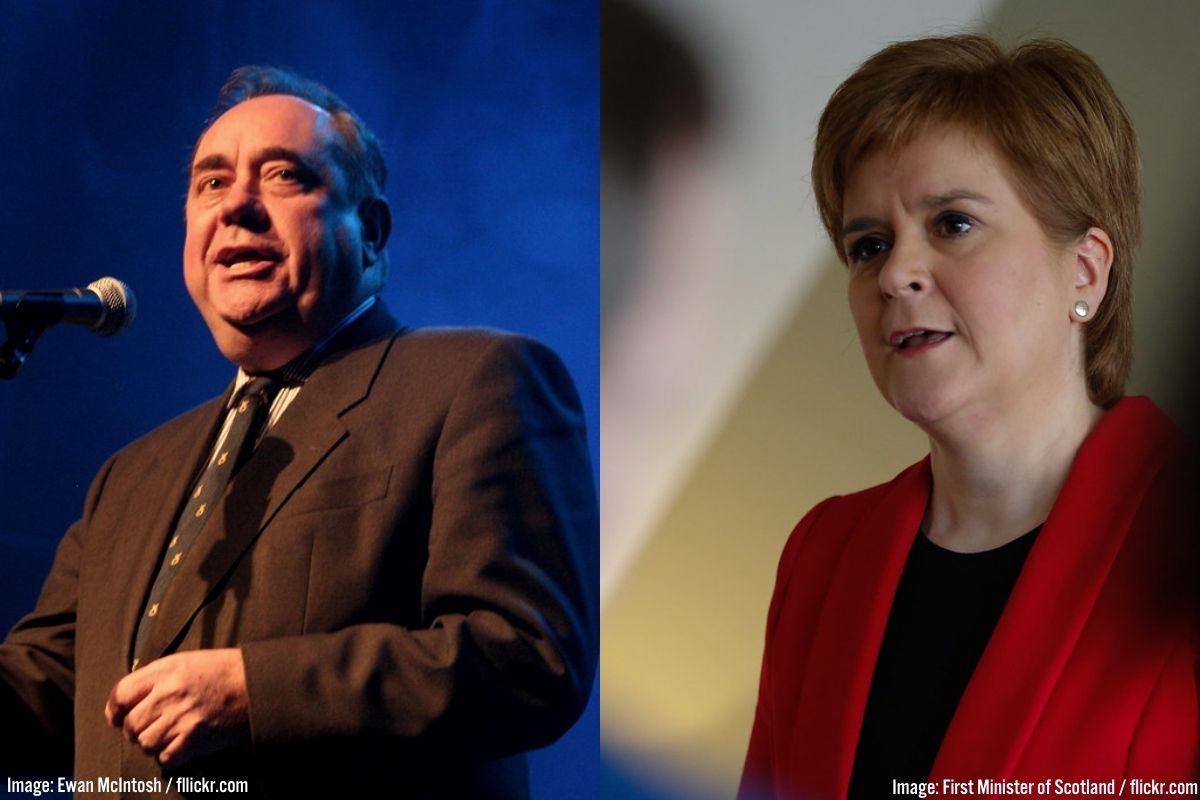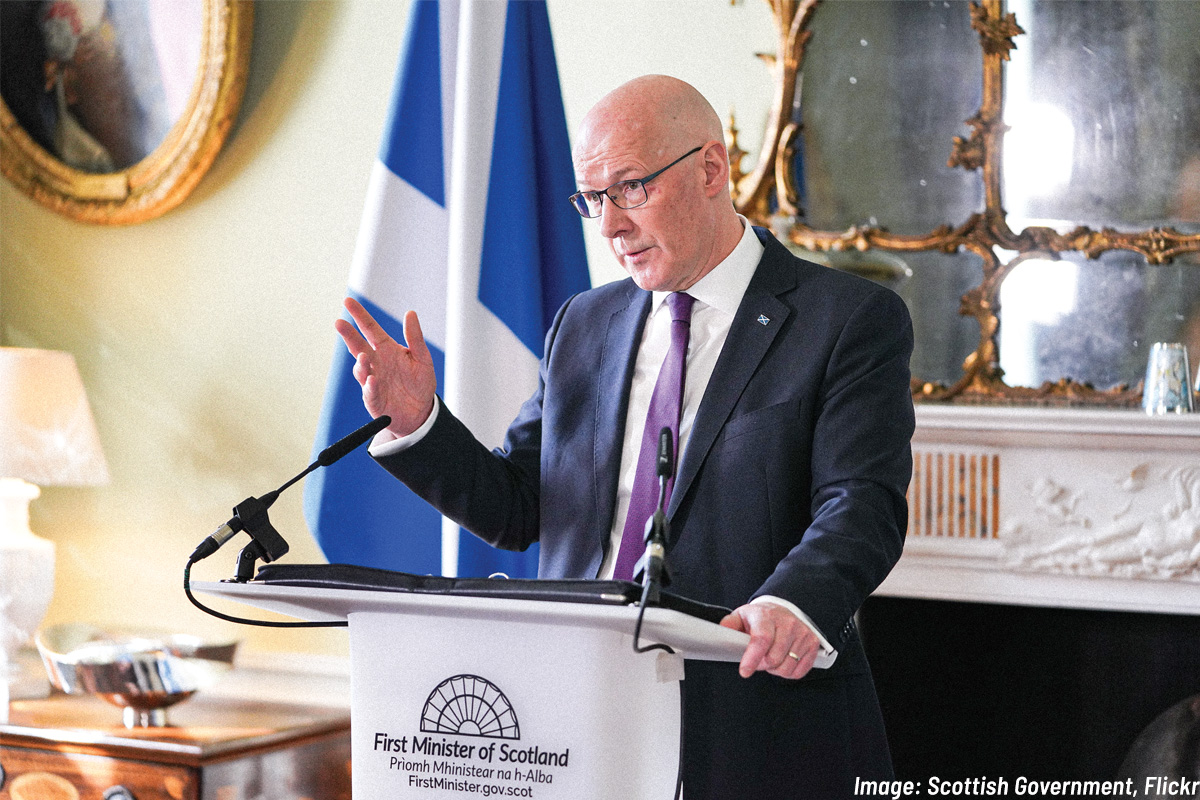With his incendiary defence against accusations of misconduct, former SNP leader Alex Salmond has lobbed a grenade into the heart of Holyrood. Nevertheless, support for independence remains solid. Explosive events lie ahead in Scotland.
It has been an explosive couple of weeks at Holyrood. Nicola Sturgeon and Alex Salmond have been testifying before a special parliamentary inquiry, pitting the current and former SNP First Ministers against one another.
Representing rival factions of the party’s upper echelons, the personal break between Sturgeon and Salmond – over the latter’s inappropriate conduct – has had deep political implications.
Inquiry and intervention

Salmond’s appearance at the inquiry was an opportunity for him to double down on the allegations of a government conspiracy to “get him” and destroy his reputation. This defence was central to his court victory last year.
Salmond also accused the First Minister and others of lying to the inquiry over the timeline of events surrounding the complaints of sexual harassment made against him.
Sturgeon instead argues that Salmond tried to get her to intervene to protect him from the complaints by arranging a closed arbitration process, using the threat of his resignation from the SNP to arrange a meeting for this request. Much of the inquiry hearings have revolved around the timing and transparency of such meetings between Sturgeon and Salmond.
When Sturgeon refused to intervene, and news of the sexual harassment complaints leaked to the press, Salmond felt personally betrayed. He subsequently became hostile to the Scottish government, launching legal action against its investigation into his conduct.
Conspiracy and cover up
Those investigations were ruled to be unlawful, due to a prior meeting between the investigating officer and two of the victims. Sturgeon expressed regret that such a “very serious error” led to the women involved being denied justice. She stated that the subsequent hostility the women faced may discourage other legitimate complaints about sexual harassment.
Salmond benefitted from this government mistake, as was awarded £500,000 in legal costs.
The bungling by the Crown Office over releasing and redacting evidence has also been used by Salmond to claim proof of the conspiracy against him, by the fact that evidence of its existence has been apparently covered up. He touts a “deliberate suppression of information inconvenient to the government”, which is finding an echo among opposition MSPs.
“Why did you defend the indefensible for so long,” asks Scottish Conservatives @RuthDavidsonMSP, referring to legal advice released to the Salmond inquiry.@NicolaSturgeon says initially there was “no question” the case should be dropped.
Live updates ➡https://t.co/UHfw7lFxJ0 pic.twitter.com/t7FPzkh0Ln
— BBC Scotland News (@BBCScotlandNews) March 4, 2021
The evidence Salmond alludes to (though legally may not refer to when speaking to the inquiry) has already been leaked to the public, however, and is far from the smoking gun he needs.
Nonetheless, the institutions of Scottish devolution have been thrown into question with accusations of collusion between SNP tops, the Scottish Civil Service, and government ministers.
No holds barred, Alex Salmond spoke of Scotland resembling a “failed state”, blaming a lack of “strong institutions” and the plot against him “undermining the system of government” in Scotland.
He demands that the head of the Crown Office, the Lord Advocate James Wolffe, “consider his position”, claiming bias or collusion with the government in suppressing evidence. The Permanent Secretary of the civil service in Scotland, Leslie Evans, is also an alleged co-conspirator.
Tory opportunism

Salmond asserts that the supposed plot against him shows that the line between private SNP business and public government business had been blurred by Nicola Sturgeon and her husband, Peter Murrell (also the SNP chief executive).
Despite his exculpatory remarks to the effect that he blames a “failure of Scotland’s leadership”, and not its institutions, the substance of Salmond’s accusations have been opportunistically seized by the Tories.
In the House of Commons, Tory backbencher and former minister Liam Fox – who once was forced to resign due to public corruption – compared Holyrood to a “tin-pot dictatorship”, in violation of the “rule of law” and proper “separation of powers”.
Asserting that the Scottish Parliament gets its authority from Westminster – and not, as one would presume, the Scottish people – Fox went on to question what powers they had to intervene.
Fox’s condemnations echo the leaked comments of Boris Johnson calling devolution a “disaster”, due to the success of the SNP and the emergence of the mass pro-independence movement.
The Conservatives have utilised the machinery of government in their efforts to politically combat the SNP and the rising support for independence – launching plans to brand anything funded by the UK government in Scotland with a ubiquitous Union jack.
The Tories’ plan is to compete with the SNP by ‘going around’ (that is, circumventing) Holyrood, and visibly opening the wallet of HM Treasury. Critics argue this could undermine the constitutional position of the Scottish Parliament, making it look less like the national government of Scotland, and more like a glorified council.
Tory attacks on Holyrood are very much in this vein. Sturgeon has warned that Salmond is trashing Scotland’s state institutions all for the sake of a personal vendetta. Others question what impact the scandal will have on the cause of independence.
No confidence

For now, the Scottish Tories have tabled a vote of no confidence in Nicola Sturgeon, alongside their previous motion against Deputy First Minister John Swinney. With pressure mounting, Scottish Tory leader Douglas Ross has demanded Sturgeon’s resignation.
Without a majority in Parliament, the SNP rely on their alliance with the Greens, who prop up the Scottish Government. So far, the Greens have signalled their support for a vote of no confidence in Swinney, for his refusal to release legal advice that was given to the government, and which has repeatedly been requested by Holyrood.
The Greens have also said, however, that they will wait for the results of the separate inquiry into whether Nicola Sturgeon broke the Ministerial Code. If the Tory motion is heard, the Greens’ decision would either save or collapse the SNP government – two months from an election.
Nicola Sturgeon, however, may not even be able to rely on her own camp being united. Many SNP figures have spoken publicly in defence of Alex Salmond, and have become highly critical of Sturgeon’s leadership of the party.
Angus B MacNeil MP and Joanna Cherry MP have both said Salmond should be welcomed back into the SNP, and have backed his version of events. Some have even lent credibility to the accusation of a conspiracy against Salmond.
Were the First Minister to be found in breach of the Ministerial Code, and be defeated over the confidence motion in Parliament, these figures and others may break ranks and add to calls for Sturgeon’s resignation.
Plan B

MacNeil and Cherry are also both seen as figureheads of the call for a ‘Plan B’ for independence. They point out the dead-end of simply requesting a Section 30 order from the Tory government, knowing it will be refused.
Instead, they propose that the Scottish government should begin planning for a referendum regardless; or propose another path to declaring Independence (a demand the SNP leadership have been forced to make concessions to).
Joanna Cherry was demoted to the SNP’s Westminster backbenches last month over her connection to transphobic campaigns against reform to the Gender Recognition Act. She and her supporters claim, however, that this was an attempt by Sturgeon to silence her.
The SNP conference last year was also marked by a rising oppositional trend, with Common Weal Group (CWG) candidates nearly taking an absolute majority of places on party committees, displacing Sturgeon loyalists like Alyn Smith.
A politically heterogenous trend, some of those elected (including Joanna Cherry) have taken the side of Salmond against Sturgeon. The former SNP leader is viewed by them as a more ‘radical’ leader for the independence movement.
Sturgeon still maintains enormous popularity in Scotland, however, especially among SNP members. In contrast, Salmond is viewed almost as negatively as Boris Johnson according to a YouGov survey, with a –42 rating compared to the Prime Minister’s –50.
Furthermore, polling doesn’t show the inquiry having a significant impact on support for the SNP or independence.
Constitutional clash
The class character of this SNP civil war is that of a split in the bourgeois party leadership. Gathered into separate and increasingly hostile cliques, the respective followers of Salmond and Sturgeon among the party grandees differ only incidentally on the question of how to lead the campaign for independence.
The relative ‘caution’ or ‘aggressiveness’ of the two camps is based on fundamentally the same bourgeois interests: of Scottish independence on the basis of capitalism and the austerity programme of the Growth Commission.
The independence movement must reject this programme, and refuse to side with either wing of bourgeois nationalism. Instead, it should put forward policies in the interests of the working class instead, and call for a Scottish Workers’ Republic.
Whatever the outcome of this scandal for Sturgeon or Salmond, we can expect the Tories to use the situation to further argue that the SNP and the Scottish Parliament are a failure.
Collision course

Westminster and Holyrood are already on course for a constitutional clash. Once the SNP achieve their fourth election victory in May, they will claim a mandate to hold a new independence referendum, whether Boris Johnson agrees to it or not.
The Tories maintain that such an act would be illegal. This raises the prospect of a crackdown similar to the repression in Catalonia after the October 2017 referendum. Independence movement leaders and ministers were arrested or exiled, and the Catalan government was suspended, leading to a period of direct rule from Madrid.
The British ruling class have openly considered this option. But this would be an enormous provocation and attack on democratic rights.
The independence movement should be prepared to fight back against this on a class basis, with strikes and mass demonstrations, and an appeal for solidarity from workers across Britain.






